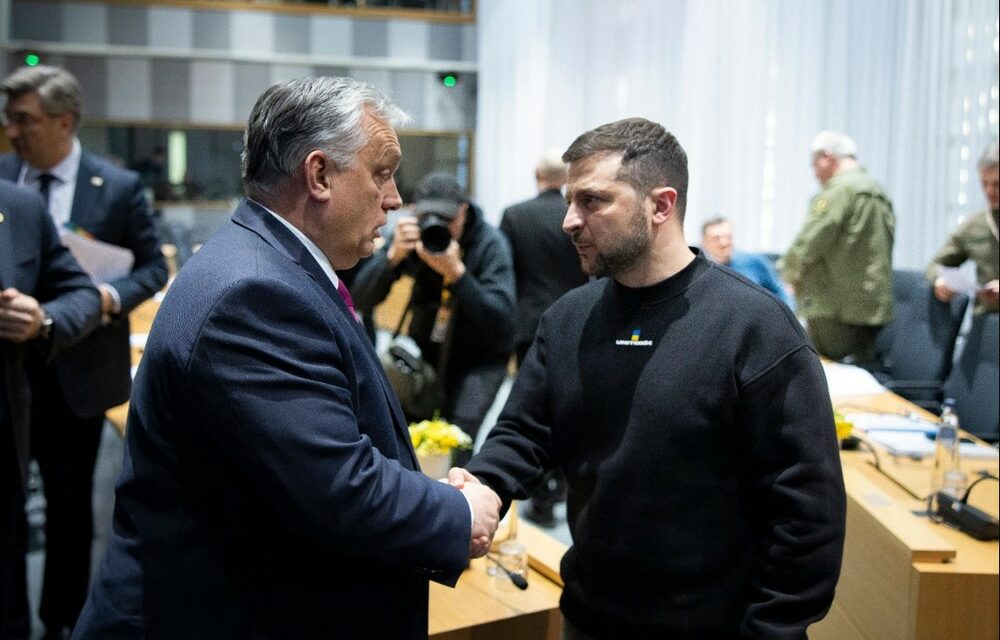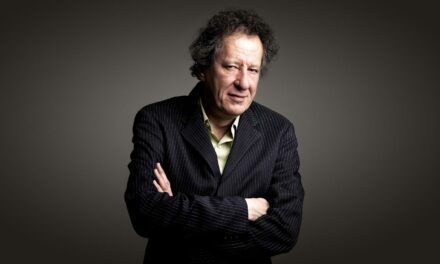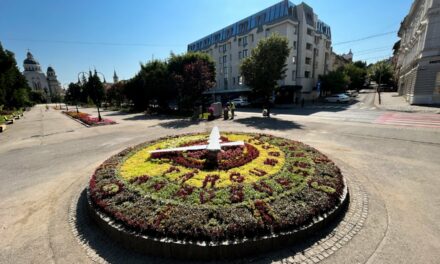The Hungarian government cannot and does not want to overstep the law of the Transcarpathian Hungarians - and these can be remedied by returning the previously existing rights of the minority community.
Péter Szijjártó's death threat; Donald Tusk's visit to Kyiv, disparaging our country; anti-Hungarian propaganda campaign in the Ukrainian press - by gathering gloomy storm clouds, the pro-war forces are apparently doing everything to thwart the Zelenskyi-Orbán meeting.
The Ukrainian and Hungarian presidents were "brought side by side by the wind" at the inauguration ceremony of the Argentine head of state, when Volodymyr Zelenskiy raised the possibility of negotiations, to which Viktor Orbán responded that he would be happy to start a dialogue if there is a result.
The preparation of this awaits the foreign ministers of the two countries, who will meet on January 29. Regarding the processes, it is worth recalling the stages of the deterioration of the Ukrainian-Hungarian relationship, and what expectations the Hungarian side has for the negotiations.
It's been more than four years since Idestova first mentioned the "Zelensky-Orbán meeting" among the labels surrounding the Pesti Srácok articles. All of this happened in connection with Dmitro Kuleba's visit to Hungary in May 2020, and it should be emphasized that since the first official visit of the newly elected foreign minister of the Zelenskyi government led to our country, we could rightly expect that changes would take place in the relationship between the two countries, which had deteriorated since 2017.
At the meeting, Minister of Foreign Affairs and Trade Péter Szijjártó spoke about the issue of the right of Transcarpathian Hungarians to education and the use of the language, among the points of contention between the two countries, in connection with a meeting of the prime ministers that had already arisen at that time.
"Hungary is waiting for the moment when the Transcarpathian Hungarian community says that everything is fine with regard to minority rights, and then our country can reevaluate its restrictive stance on Ukraine's NATO accession".
It was also important to recall all of this, because apparently the disagreements between the two countries have been stuck at the same level for four years, not only the Zelensky-Orbán meeting, but also the settlement of the rights of the Hungarian minority.
With bitter irony, we could even note that it took a war for the meeting to become relevant again. Otherwise, the specific step was initiated by Zelenskyi, at least that is what Viktor Orbán's words at the traditional end-of-the-year Government Info indicate, where he recalled to a journalist's question: during the inauguration of Argentine President Javier Milei last December, the two heads of state were "driven by the wind".
The Hungarian Prime Minister added that during the short conversation he accepted Zelensky's invitation to start negotiations, the only stipulation being that they should sit at a table if there is something to agree on. The preparation of the negotiations will thus be the task of the two foreign ministers, so in fact the case is really there, as it remained after the Kuleba-Szijjártó foreign minister meeting in Budapest in 2020.
The stake of the meeting for the Ukrainian side is definitely the desired NATO and EU accession, the latter of which our country was the loudest and only representative on the EU political stage until Ukrainian diplomacy stabbed our country in the back by trampling minority rights into the mud.
Since 2017, our country has tried to use the tools of international diplomacy to gain a better understanding of Kiev - hindering, for example, the NATO accession processes -, based on the experience of the Ukrainian resistance that has lasted for years, it can be rightly stated that the Zelenskyi government was better suited to extreme nationalist communication against minorities at the state level and the maintenance of hostile relations towards our country, like the rapprochement with the West, in which even the war did not bring relief until the end of last year.
Although during the preparation of the EU accession process, the Ukrainian parliament made some amendments to the law, which also affected minorities, the dissatisfaction of the Transcarpathians and the motherland is well exemplified by Viktor Orbán's withdrawal from the EU Heads of State Summit vote on Ukraine's accession to the EU.
Even though the domestic and European left-liberal press was fond of munching on the idea that German Chancellor Olaf Scholz had "sent the Hungarian Prime Minister out for coffee", in reality, Hungarian diplomacy replaced one veto with countless ones, since each and every in connection with the accession chapter, as well as the payment of EU funds intended for Ukraine.
In the light of all this, Donald Tusk, who was traveling to Kiev for a day on his first official visit after his inauguration, tried to "make bed" in a perhaps not unexpected way.
The Polish Prime Minister, who is building his dictatorship under the rule of law, attacked the Hungarian position on the war in Ukraine with unsolicited words, accusing our country of "betraying Europe, being un-European", and referring to Hungary as "the darkest place of political hell".
Perhaps it is no coincidence that Péter Szijjártó was threatened with death in a letter sent to the representatives of the Ministry of Foreign Affairs and Trade in Ukraine in connection with the Hungarian-Ukrainian foreign minister's meeting in Ungvár, scheduled for January 29, in preparation for the meeting of the heads of state.
In it, among other things, they write: "Hungarians, we hate your government, which continues to do everything to make us lose the war. Do you think that your minister will just come to us after the attacks on Ukraine? We don't think so. On January 29, they can expect an explosive welcome. An armored train will not save you. We recommend that you place an order with a funeral home so that they can start making the coffin for Szijjárto and that it fits his height. God forgives, but Ukrainians don't".
In light of the threats, the question naturally arises as to where the Zelensky-Orbán meeting should take place.
Although the assassination by fired-up Ukrainian extremists is an obvious indication that Viktor Orbán would only be met with even greater resistance in Kiev, if possible, it is equally in the interest of the pro-war Union and the United States that Zelenskyi might get into trouble during a possible visit to Budapest, this because it would be equivalent to the desired III. With the advent of World War.
It is also important to address separately what expectations the Hungarian side will have when sitting down at the negotiating table. In this regard, Péter Szijjártó has already formulated preliminary thoughts, but Pesti Srácok also asked several relevant politicians and experts in this regard. In a video shared on Facebook, the Minister of Foreign Affairs, essentially referring to the basic simplicity of settling the issue, said that
in relation to the minority law, Hungary's expectation is to return to the conditions of 2015,
at the same time, he called the EU accession processes a significant commitment of the West from a historical point of view, and therefore considered it unprepared on the part of the European Union itself in this form.
In more detail, Zsolt Németh writes in "The Struggle for Remaining. The Hungarians of the Carpathian Mountains (1944–2022)'', in his welcome speech given in connection with the recently presented study volume, discussed the Hungarian position that can be expressed in connection with the Zelenskyi-Orbán meeting. Among other things, the chairman of the Foreign Affairs Committee of the Parliament spoke about: if Ukraine becomes a democratic country that ensures the generosity of linguistic minorities, its most important benefit will be not only the Transcarpathian Hungarians, but Ukraine's real European future.
As he explained, although the amendment of the Ukrainian minority law a few weeks ago is a good start, the way to continue the negotiations will be determined by the expectations of the Venice Commission, the Council of Europe, and the European Union. Zsolt Németh emphasized that the current Ukrainian minority protection lacks what it had in the past:
- cultural autonomy,
- collective rights,
- guaranteeing parliamentary representation,
- the possibility of official language use,
- the existence of a minority educational institution as a legal institution,
- nationality education in vocational schools and higher education,
- the use of place names and geographical names in the national language,
- free use of symbols
The chairman of the commission also emphasized that settling the case of the Transcarpathian Hungarians and the national minorities in Ukraine in general would take "the most effective weapon" out of Vladimir Putin's hands, the minority issue itself, which Russian diplomacy uses as an argument to justify the war.
Transcarpathian Hungarian MEP Andrea Bocskor spoke about the fact that in recent years, a lot of tension and misunderstandings have built up between the two peoples, primarily due to the deliberate anti-Hungarian propaganda of the Ukrainian media starting in 2017, which has affected the Transcarpathian Hungarians. As he added, the Ukrainian media is trying to make people believe that Transcarpathian Hungarians are revisionists, they want to separate Transcarpathia, they want to "buy" the institutions by the pound.
Andrea Bocskor believed that at a top-level meeting, if people see that there is a common voice between the leaders of the two states and that dialogue is established, it would also be positive for Transcarpathian Hungarians.
He believed that the most important result of the meeting would be if the Ukrainian minorities would get back the rights they had before. The amendment to the law adopted in December does not reflect on the issue of higher education or vocational education, national symbols, or autonomy. According to the EP representative, in case of an intergovernmental agreement, Transcarpathian Hungarians could finally play the role of a bridge between the two countries. At the same time, he also touched on the fact that the support of the European mainstream would also be important in terms of the processes, for example, if the Hungarian side draws attention to the fact that Ukraine does not meet the expectations of either the Venice Commission or the European Commission in the field of national minority protection, then it should not let the answer be that the Hungarians are "Putin's minions" and criticize Ukraine only because that is what Moscow expects.
They must understand that we have real grievances and we only want to get our previous rights back, he emphasized.
Russian Ildikó, II. Ferenc Rákóczi, the president of the Transcarpathian Hungarian College, spoke about the most important thing being the settlement of the detailed issues that were not settled by the recently adopted minority law. As he pointed out, there are many flaws in the minority law, for example, that the issue of language use in a specific area will have to be decided by voting. He believed that the outcome of such a vote should not be in question, where the number of Hungarians does not even reach 10 percent. Ildikó Orosz pointed out that the devil is hidden in the details, these must be clarified, if the vest is buttoned to one side, then the whole thing must be buttoned again.
The issue is not complicated by the Hungarian position, but by the Ukrainian one, since the Transcarpathian Hungarians only want to get back their previously acquired rights, nothing else. Ildikó Orosz responded that, in fact, these are not complicated negotiations, only a positive attitude is needed.
Speaking about the negotiations, László Brenzovics, the president of the Subcarpathian Hungarian Cultural Association, said that the relationship between the two countries has been extremely bad for a long time, despite the fact that they are neighbors.
Although the citizens of both countries are interested in balanced relations, the development of this is not helped by the anti-Hungarian campaign in Ukraine, during which they tried to misrepresent the Hungarian position as much as possible.
As a result, Hungary is the second most negatively judged country in Ukraine, after Russia, he emphasized.
László Brenzovics believed that it is a good indication of the insincerity of Ukraine's intentions that, since 2017, Kiev has only started dealing with the issue of minorities after the European Commission discussed this issue, even though the problem has already been raised not only by our country, but by the Carpathian Basin as a whole.
At the same time, the president of the KMKSZ believed that there is scope for improving the relationship between the two countries, since based on the basic agreements, joint committees should operate (some of them do) that settle controversial issues. László Brenzovics touched on the fact that, unfortunately, in the course of history, Transcarpathian Hungarians have been the focus of international attention several times, in recent years the issue of Hungarians has been dealt with in the Council of Europe and the European Commission, but it also appears that European politicians and professionals do not have sufficient information , which is reflected in their decisions and attitudes.
Cover image: Viktor Orbán and Volodymyr Zelensky ran into each other at the inauguration of the Argentine president
Source: MTI/Minister's Press Office/Zoltán Fischer












